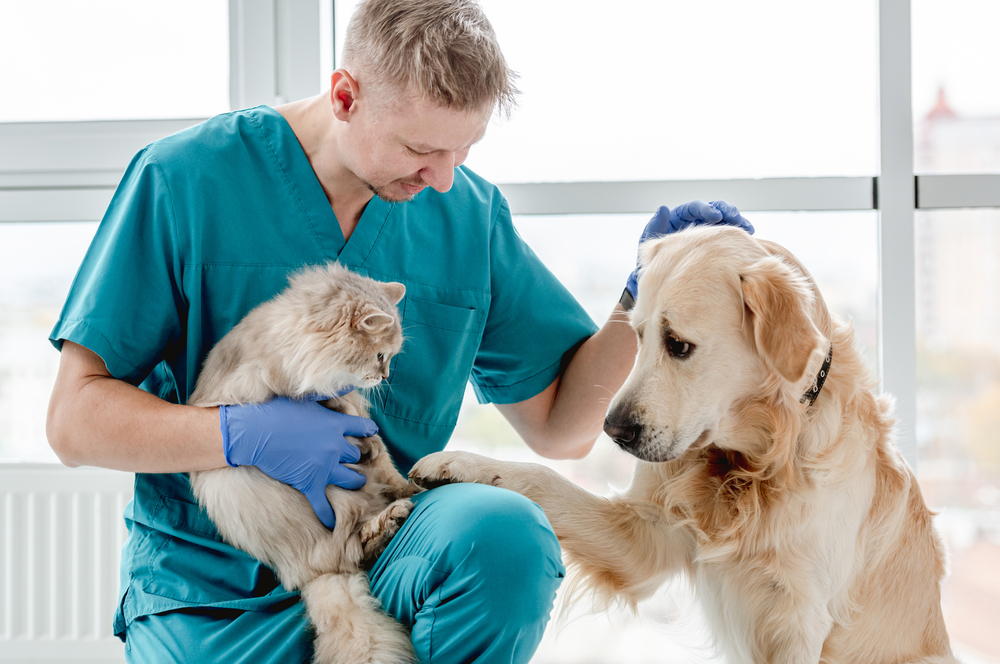The pancreas is a small abdominal organ inside your pet’s body that carries big responsibilities, including secreting hormones that manage blood glucose levels and enzymes needed for digesting food. Many body functions can go awry when the pancreas becomes inflamed, and lead to illness, hospitalization, and death in severe cases.
Although most pancreatitis cases in dogs and cats have no known underlying cause, around 10% of cases in dogs are caused by sudden dietary changes, particularly with fatty foods. Every year, our Mount Pleasant Animal Hospital team sees pancreatitis cases increase around the holidays, so we want pet owners to understand the risk factors and know what to look for and what to do if their pet shows pancreatitis signs. Here is our pet owners’ guide to pancreatitis.
What is pancreatitis in pets?
Pancreatitis is an inflammatory condition that initially affects the pancreas but can have far-reaching systemic effects. Inflammation begins when the digestive enzymes that the pancreas usually secretes are prematurely activated, damaging and killing neighboring pancreatic cells. The damage can spread to other nearby tissues, and the chemical inflammatory mediators and the activated enzymes circulate in the bloodstream. The result is malfunction of other organs and body systems, including the liver, kidneys, brain, lungs, or heart.
Pancreatitis may suddenly occur as a severe (i.e., acute) illness, or present as a milder, more chronic disease with vague signs. Severely affected pets may suffer complications that include multiple organ failure or disseminated intravascular coagulation (DIC), a clotting problem that can lead to death.
Pet pancreatitis risk factors
The risk factors for pancreatitis development are many and varied. Breed is a significant factor in dogs—miniature schnauzers seem genetically predisposed to disease development. Other at-risk breeds include Yorkshire terriers, cocker spaniels, dachshunds, poodles, and Arctic breeds, while other risk factors and possible inciting causes include:
- Certain drugs
- Infections
- Anesthesia
- High blood triglycerides
- Diabetes
- Cushing’s syndrome
- Liver disease
- Inflammatory bowel disease
- Blunt trauma
- Dietary indiscretion, especially with fatty foods
Pet pancreatitis signs
Pancreatitis signs depend on an acute or chronic onset. Acutely ill pets may show:
- Vomiting
- Refusal to eat
- Weakness
- Abdominal pain
- Dehydration
- Diarrhea
- Fever
- Jaundice (i.e., yellow coloration to eyes and skin)
Chronic pancreatitis is harder to identify, because signs can be vague and ongoing, including occasional vomiting or diarrhea or a waxing and waning appetite. Some pets with pancreatitis are subclinical, meaning that they show no apparent outward disease signs, despite laboratory results that point to a pancreatic issue.
What to do if you think your pet has pancreatitis
Acutely ill pets who show the pancreatitis signs listed above should see a veterinarian as soon as possible. If our hospital is closed, call the nearest veterinary emergency facility for care. Pancreatitis can mimic many other equally serious gastrointestinal (GI) conditions, such as a foreign body obstruction. Early diagnosis and intervention offer the best chances for complication prevention. Pets with vague, non-specific signs and underlying risk factors who are stable at home should schedule a regular visit with our veterinary team.
Pet pancreatitis diagnosis and treatment
Definitive pancreatitis diagnosis requires a fine needle aspirate or tissue biopsy of the pancreas, which is not only impractical but also often too risky for already sick pets because anesthesia or exploratory surgery may be required. Instead, veterinarians may use a combination of test results to reach a reasonable conclusion of pancreatitis. Tests may include:
- Complete blood count and blood chemistry profile
- Abdominal X-rays
- Abdominal ultrasound
- Pancreatic lipase immunoreactivity (PLI) blood test
Acute pancreatitis patients are typically admitted to the veterinary hospital for inpatient care with supportive treatments, including fluids, pain medications, anti-nausea medications, and dietary support, or treatments to counteract complications as they develop. Pets are fed a low-fat diet to reduce their pancreas’ workload and improve digestibility. Also, hospitalized pets are encouraged to eat as soon as possible and not “rest” the pancreas, which is proven to speed recovery.
Pets should stay on the low-fat diet after their release from the hospital to reduce recurrences. Chronic pancreatitis is addressed with a diet change and treating underlying risk factors, such as medication to lower cholesterol or better control diabetes. Chronic pancreatitis is sometimes considered auto-immune and responds well to immune-suppressing medications.
Fatty foods and diet changes can sometimes induce pancreatitis in susceptible pets, while other cases may have no discernible cause. Regular wellness examinations and screening tests can provide a baseline and help our Mount Pleasant Animal Hospital team identify and address risk factors to prevent development of this inflammatory condition. Call us to schedule a routine visit, or if your pet needs veterinary care for suspected pancreatitis or other illness.
To learn more about our sister hospitals and to find your nearest location, visit Animal Hospitals of the Lowcountry.








